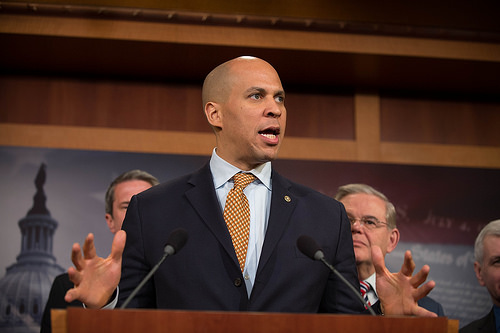
Historian Arthur Schlesinger, an adviser to President Kennedy and one of the leading liberal intellectuals of the past century, applied a disapproving label for those on the left who made impossible demands for moral purity in complex matters of policy. He called such people "doughface liberals". Schlesinger identified as one prominent example the Northerners who condemned slavery but could not bear to support the Civil War.
Peter Beinart, the liberal journalist whose book The Good Fight says "doughfaceism" undermines liberalism's political viability in the American mainstream, found other examples early in the post-September 11 debate over the war in Afghanistan. As Beinart notes, liberal guru George Lakoff joined MoveOn in warning that U.S. bombing campaigns against the Taliban would be unacceptable because they would inevitably produce civilian casualties. Beinart rejects the assertion of a moral equivalency between the Taliban role in terrorist violence that deliberately killed civilians and the American bombing campaign to unseat the Taliban regime. "The moral difference was about as stark as one could find in the real world of international affairs," writes Beinart. He goes on to observe that: "At its core, doughface liberalism offers an escape from the choices the real world requires."
Now another lamentable demonstration of "the doughface fantasy" presents itself in the form of the Democratic politicians whose response to the Trump administration's reprehensible policy of family separation at the border has been to call for the abolition of ICE. Sen. Corey Booker, the New Jersey Democrat, has joined the ranks of the doughfaced with his essay for Vox about his trip to the Texas-Mexico border.
After declaring that his brief visit to the borderlands left him "emotionally raw", Booker goes on to demonstrate that it also left him not only filled with self-righteous indignation about Trump's cruelty, but also astonishingly clueless about the moral ambiguity of the policy dilemma at the border. Summing up what he learned from his border visit, Booker writes that we:
[M]ust do a lot better to reflect our values in the way we treat immigrants to our soil. … [O]ne thing is abundantly clear: We are at a moment of moral crisis in America. … Our system is a mockery to good immigration policy and Law and Order. ... Right now in the border crisis, there are agents of love and agents of fear. My hope is that we don't let the fear and the hate it yields divide us beyond repair. I will always have faith that in America, ultimately, love prevails.
Such sentiment is guaranteed to activate the cerebral pleasure centers of the Kumbaya crowd. But what in the world does it mean? Booker's ostentatious outpouring is nothing more than moral exhibitionism unless it is matched with rigorous thinking that produces ideas rooted in an acknowledgement of what a column in the Honduran publication Proceso acknowledges as the "new era" of emigration from that terribly dysfunctional, divided, unjust, demoralized, corrupt, leaderless, impoverished, and violent country. What is the extent of our moral and humanitarian obligation to the hundreds of thousands of Hondurans who are yearning for a chance to escape? Should we continue an asylum policy that, while noble in intent, has had the perverse effect of creating an exodus propelled by the remarkable fact that anyone who makes it to the border can seek asylum and gain admission during the months or years it takes to adjudicate the case? On these concerns — essential to the formulation of policy that is just, coherent, balanced, and sustainable — Booker is silent.
Trump, for all his racist cruelty about asylum seekers he says are "infesting" our country, at least understands that the asylum system presents a dilemma for policy-makers. Booker's self-indulgent doughface-ism shows no understanding of what Arthur Schlesinger observed when he wrote:
America has so long seen itself as the asylum for the oppressed and persecuted — and has done itself and the world so much good thereby — that any curtailment of immigration offends something in the American soul. No one wants to be a Know-Nothing. Yet uncontrolled immigration is an impossibility; so the criteria of control are the questions the American democracy must confront.
Booker's moral preening may be good for his run for the Democratic presidential nomination. But it will be bad for the country unless he summons the integrity and intellectual honesty to acknowledge the complexity and ambiguity of the current situation. For example, the above-mentioned Proceso column reports that this year an average of 200 Hondurans have decided to migrate every day, a 42 percent jump over last year. As for the motivating factors, the Proceso column cites the findings of the Observatory of International Migrations in Honduras that those leaving the country: "point to the same reasons as before ... the lack of employment and opportunities, the flight from violence, and the search for family reunification [with relatives established primarily in the United States]. Nevertheless, employment and the search for a better life continue to be the most frequent reason."
The search for a better life is universal. It is admirable. To assert that it is a basis for asylum is a doughface fantasy that will help Donald Trump win four more years in the White House.
